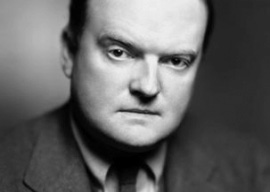
January 26, 2012

Edmund Wilson
Edmund Wilson was America’s premier man of letters during the middle of the 20th century. The Wound and the Bow, To the Finland Station, and Memoirs of Hecate County are still in print, as are his journals about the 1920s, 30s, and 40s. He was a literary critic par excellence, a friend of both Scott Fitzgerald (whose death at 44 shook him greatly, as Wilson was only a year older) as well as Hemingway, who counted Wilson as one of the few men he would not bully. Wilson was often married, his third wife being the beautiful Mary McCarthy—as good a writer as he was—whom he divorced in 1946 for champagne heiress Elena Mumm Thornton.
I admire Wilson’s prescient thoughts on Greeks back in 1945, when he flew into that tortured country reporting for The New Yorker. One of the first Americans he met on the ground asked him whether the war between Sparta and Athens was still going on. Wilson does not comment on the breadth of the man’s ignorance. He lets it stand by itself, which does the job perfectly. Uncle Sam’s foreign policy has always and will always be based on total ignorance of history. Mind you, there was a war going on back in 1945. It was a civil war, but Athens and Sparta were not the protagonists; nationalists versus communists were on center stage. But at least the poor ignoramus who asked the dumbest of all questions long before George W. asked about Sunnis and Shi’ites had an excuse—he was a simple military adviser, not president of the United States.
As he tells it, Wilson saw a kiosk on Syntagma Square with books about flagellation. While he perused them, a British officer bought a whole lot of them. A GI in a truck going into Athens told him that the city is a fine place—cleaner than Italy. He writes that this was where the people had nothing, “but they were more self-respecting than in Italy: few beggars or prostitutes, little servility. Men somehow more decently dressed than in Milan [hard to believe that], people serious, cared nothing about making a show. Women not nearly as attractive as in Italy [easy to believe].”
I was eight years old and living in Athens at the time, and his remarks bring back lots of memories, not all of them pleasant. But yes, the people were still very proud back then—not a bunch of moochers like today—and yes, we had beaten the hell out of the Italians, and yes, we held out against the Germans better than the Dutch, Belgians, and French, hence we could hold our heads up high.
Wilson is not a fan of the Italians, nor of Italy. He describes the big pink buildings with green blinds—which I happen to like—as ridiculous, as well as the “ludicrous gigantic plastery-looking statues.” He witnesses such poverty and filth in Naples that at times he feels, “Let the Americans take it over and make it into something which will be much better if it is only as good as Stamford Conn.” Swapping Stamford for Naples? Well, golly gee and Jesus H. Christ! He thinks Italy and Greece might be kept on as quaint and picturesque old places, a bit like New Orleans is for the Americans.